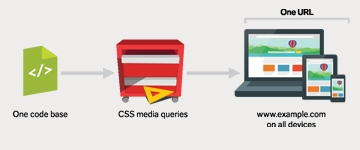With more and more people using their phones to surf the internet, it has turn out to be really important to design a website that works across various platforms. After making a mark in the beginning of 2012, responsive web design is today firmly established as the finest way to make a website mobile visitors are fond of, and has developed to be a dominant feature of the modern web design landscape. Last year might have been addressed as “The Year of Responsive Design”, however now it is far from news.
In simple words, responsive design means a website’s pages reformat themselves, making sure that whether the content is seen on a handset, tablet, or desktop PC, the website will continue to be user-friendly. This is extremely different from former mobile solutions of designing a separate mobile site.
Nevertheless, when it comes to Search Engine Optimization, can a responsive design increase the possibilities of a website succeeding in the Search Engine Result Pages? The answer is an absolute yes, and here’s why.
Google Strongly Likes Responsive
Google not just favors Responsive Web Design as the finest means to target mobile users, however prefers mobile-optimized sites as well, while providing results for searches made on a mobile gadget. This is particularly correct when mobile consumers look for local services.
One Website, One URL
From an SEO viewpoint, one of the major challenges posed by having a separate mobile website is that you will require building the authority of this site from scratch, and nearly all separate mobile sites do not rank high in search engines, since they are canonicalized to the PCs. Contrariwise, redesigning your website as responsive will allow you to retain your backlinks, and will mean that you can put emphasis of your SEO on one particular site. This means all of your links will be focused on one domain (compared to one mobile website as well as one desktop site), providing your responsive website a boost in the Search Engine Result Pages.
Responsive Web Design Helps Combat a High Bounce Rate
Even if a website is having a sound ranking on search results and doesn’t work successfully for mobile as well as tablet users, bounce rate will be a major problem. Mobile websites can be disadvantaged by a high bounce rate if the content they provide is too stripped down, or too different from the content available on the desktop site. Google will define this high bounce rate as a sign that a site isn’t providing appropriate content to users, which is likely to cause a drop in rankings.
User Experience is better
Websites are basically a tool for sharing content. An easy site makes it stress-free for visitors to find, absorb, as well as forward the content. Above everything else, RWD put emphasis on designing for the user – and with user experience being a major ranking issue; it makes sense that Google is encouraging developers to make the most of responsive design.
